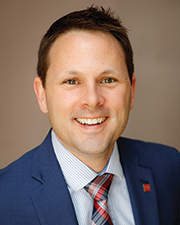
Bedford, NH Dave Gambaccini, CCIM and senior director of SVN | Commercial Real Estate Advisors, will serve as the 2020 president of the New England CCIM Chapter of the CCIM Institute effective January 1st. Dave has successfully operated his own independent commercial real estate investment company since 2006 as an owner/investor. Gambaccini currently focuses on the efforts of expanding the SVN brand in New Hampshire. He provides commercial real estate services to investors, family offices, high-net-worth individuals, developers, owners and operators, helping them to identify, acquire, develop, sell or reposition assets in the $1 million to $25 million range throughout New England and across the U.S.
“I am honored and humbled by the opportunity to serve the New England CCIM Chapter and its members. I believe in mentoring new-to-industry professionals and providing opportunities for all commercial real estate professionals to excel in their careers, through CCIM Institute Education and industry networking events,” said Gambaccini.
Karen Hurd, current chapter president, said, “I am thrilled to announce Dave Gambaccini will be leading the New England CCIM Chapter in 2020. Dave is a respected thought leader with vast knowledge and expertise who brings value across all commercial real estate industry segments. As an active board member and program director in 2019, Dave has made outstanding contributions to our members. I am confident the New England Chapter and the CCIM Institute will continue to thrive under his leadership.”
The New England CCIM Chapter 2020 slate of officers also includes:
• Immediate Past President – Karen Hurd, CCIM, managing director, Baker Tilly;
• Treasurer - Thomas Cormier, CCIM, manager, PwC;
• Secretary - Michael Chase, CCIM, managing director, SVP, NorthMarq;
• Director at Large - Michael Delsesto, acquisitions manager, Mount Vernon Co.;
• Director at Large - Amanda Stevens Snell, principal, The Stevens Group; and
• Director at Large - Jeremy Cyrier, president and commercial real estate advisor, MANSARD.
The New England CCIM Chapter is one of more than 50 CCIM Institute chapters created to improve benefits to CCIM members and increase their involvement in the organization’s networking and comprehensive education for commercial real estate professionals, as well as legislative, national, and global activities. The New England CCIM Chapter encompasses Massachusetts, New Hampshire, Maine, Rhode Island and Vermont.
CCIM Institute is a global community of 13,000 members, more than 50 chapters, and 30 countries that educates and connects the world’s leading experts in investment strategy, financial analysis, and market analysis.
CCIM Institute created the language of global real estate investment. Thier courses and worldwide community deploy commercial real estate investment methodologies and tools that speed the pathway between opportunity, a go/no-go decision and success for an asset, taught by instructors who are themselves industry leaders. Today, the organization, through its 50 chapters, continues to innovate best practices and elevate the commercial real estate professional through its core designation program to earn the CCIM pin–real estate’s most coveted credential–and its topical education courses offered through the Ward Center for Real Estate Studies.
In addition, membership in CCIM includes the industry’s best technology and operational platform, allowing entrepreneurial and mid-sized businesses to compete with the largest multinational providers. Today, almost 70% of designees hold the title of owner, partner, principal, or president, representing an exclusive worldwide referral network of 13,000 members in 30 countries. Ultimately, CCIM represents a larger vision of the commercial real estate provider, leveraging investment analysis, opinions of value, and underwriting to become a leader in sourcing capital, building a cash-flow vehicle, and ultimately creating value.








